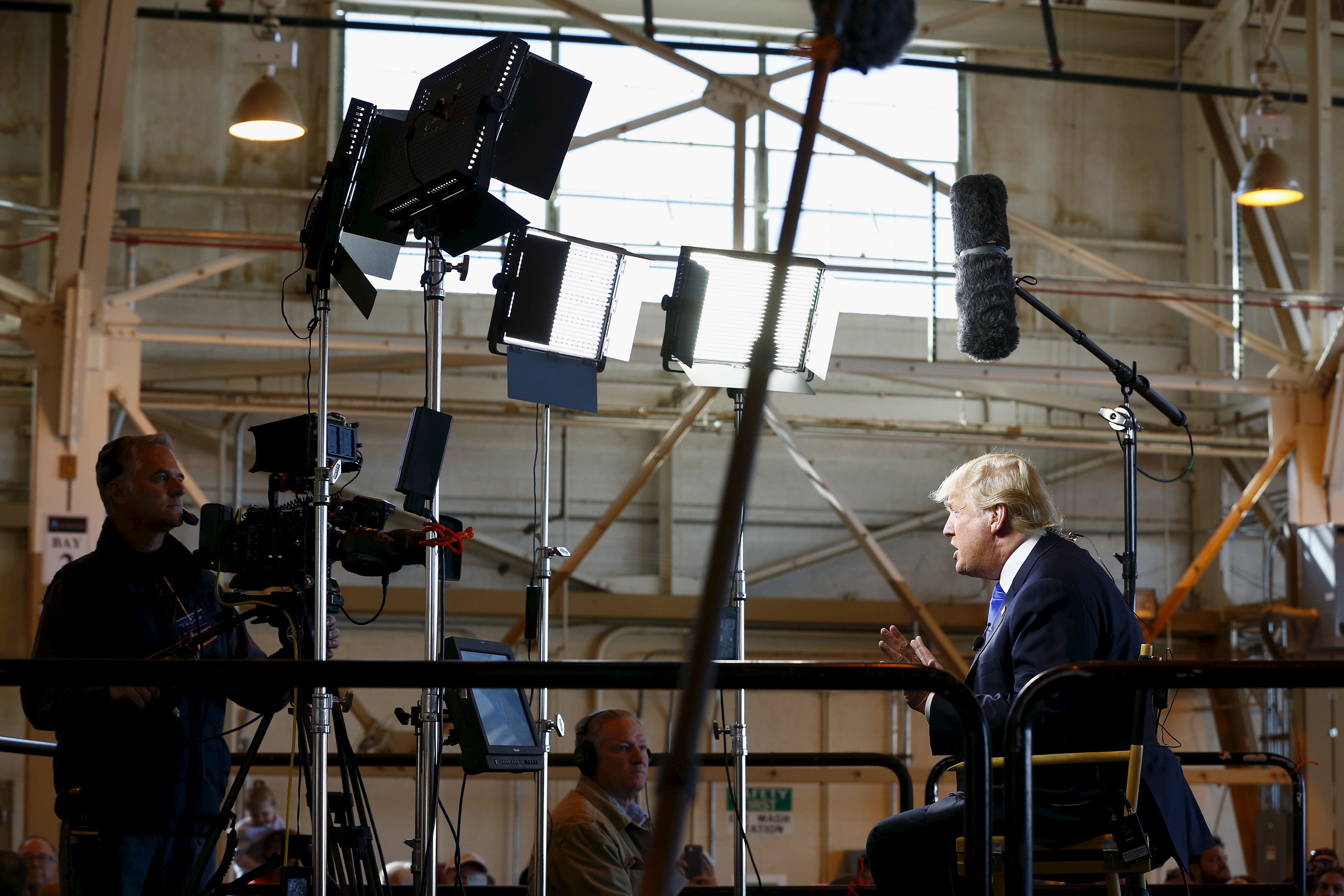Is the media to blame for President Trump?
Be skeptical


America selected Donald Trump to be the 45th president of the United States on Tuesday. While of a piece with the Republican Party's rapidly deteriorating character, he is a candidate who also plumbed new depths of racism and thuggery during his campaign. It's an astonishing upset, in the grimmest fashion; one that huge portions of the media and political establishment never saw coming.
The question many liberals will be asking now is, what happened? And one culprit that's already getting a lot of attention is the media — journalists, news outlets, the chattering class.
The charge comes in two flavors. The first says "all publicity is good publicity," and that Trump was artificially aided by a flood of coverage. The second version of the argument is more subtle: That while plenty of Trump's coverage was negative, the media often packaged that coverage in a larger context — particularly the obsessive coverage of Clinton's email scandal — that effectively "normalized" Trump's candidacy.
The Week
Escape your echo chamber. Get the facts behind the news, plus analysis from multiple perspectives.

Sign up for The Week's Free Newsletters
From our morning news briefing to a weekly Good News Newsletter, get the best of The Week delivered directly to your inbox.
From our morning news briefing to a weekly Good News Newsletter, get the best of The Week delivered directly to your inbox.
There are big problems with both versions.
The first is that both arguments simply assume a priori the media's power to shape public perceptions, and even voting behavior, on a mass scale. The second version of the argument in particular ascribes enormous power to extremely subtle decisions, like the relative distribution of coverage for different stories, the wording of headlines, and more.
But the existence of the media's great power is never actually demonstrated. To the extent that we can analyze actual data to answer the question, skepticism of the media's influence seems to be the best conclusion: While every candidates' polling in 2016 closely tracked their share of coverage, looking at the polls and coverage over time makes it exceedingly difficult to tease out any causal relationship — in Trump's case, his rise in the polls and his rise in coverage tracked almost perfectly. Which leaves a big question mark as to which came first, or gave rise to the other.
It's also worth noting that audiences for the major newspapers, TV shows, and magazines that focus on national-level coverage also tilt towards the affluent. A lot of media coverage is much more a matter of members of the upper class talking to the other members of the upper class than it is a matter of "the media" talking to voters as a whole.
A free daily email with the biggest news stories of the day – and the best features from TheWeek.com
Rather than assuming the media wields serious influence over voters, it seems more likely that the media is largely powerless over them.
Of course, pointing that out isn't the same thing as defending the media's behavior on the merits. And I don't think any such defense is really possible: Lots of media coverage is frivolous and amoral, chasing clicks at the expense of real journalism.
But saying this frivolousness gave us Trump also implicitly says that his voters only supported him out of ignorance.
This speaks to a key dispute that's emerged this election cycle, one that presents two different interpretations for Trump's rise. Is he purely the product of voter ignorance, incipient racism and misogyny, and a backlash against the recent gains of long-oppressed groups like women, immigrants, and African-Americans? Or is he also a backlash against very real failures in our social fabric; increasing inequality, dying towns, social dislocation, alienation, and a chronic lack of jobs, all overseen by a sclerotic elite amassing ever more power?
Assigning the media the majority of the blame for Trump's victory say it's option one. It attributes his rise to a failure to properly put down a set of toxic cultural trends, rather than to any set of material problems in our society that require some radical changes in who gets resources and support.
In so doing, the argument actually rubber-stamps an elitist understanding of the media's place and purpose, even as it critiques the media's behavior. It endorses the idea that reporters, journalists, and commentators are the parents, and voters are their children. It says reporters' only mistake was not taking seriously enough their duty to guide and mold their charges.
Assuming that is and should be the relationship between the media and the people is the first and most basic mistake here.
Jeff Spross was the economics and business correspondent at TheWeek.com. He was previously a reporter at ThinkProgress.
-
 The best dark romance books to gingerly embrace right now
The best dark romance books to gingerly embrace right nowThe Week Recommends Steamy romances with a dark twist are gaining popularity with readers
-
 The ocean is getting more acidic — and harming sharks’ teeth
The ocean is getting more acidic — and harming sharks’ teethUnder the Radar ‘There is a corrosion effect on sharks’ teeth,’ a study’s author said
-
 6 exquisite homes for skiers
6 exquisite homes for skiersFeature Featuring a Scandinavian-style retreat in Southern California and a Utah abode with a designated ski room
-
 The billionaires’ wealth tax: a catastrophe for California?
The billionaires’ wealth tax: a catastrophe for California?Talking Point Peter Thiel and Larry Page preparing to change state residency
-
 Bari Weiss’ ‘60 Minutes’ scandal is about more than one report
Bari Weiss’ ‘60 Minutes’ scandal is about more than one reportIN THE SPOTLIGHT By blocking an approved segment on a controversial prison holding US deportees in El Salvador, the editor-in-chief of CBS News has become the main story
-
 Has Zohran Mamdani shown the Democrats how to win again?
Has Zohran Mamdani shown the Democrats how to win again?Today’s Big Question New York City mayoral election touted as victory for left-wing populists but moderate centrist wins elsewhere present more complex path for Democratic Party
-
 Millions turn out for anti-Trump ‘No Kings’ rallies
Millions turn out for anti-Trump ‘No Kings’ ralliesSpeed Read An estimated 7 million people participated, 2 million more than at the first ‘No Kings’ protest in June
-
 Ghislaine Maxwell: angling for a Trump pardon
Ghislaine Maxwell: angling for a Trump pardonTalking Point Convicted sex trafficker's testimony could shed new light on president's links to Jeffrey Epstein
-
 The last words and final moments of 40 presidents
The last words and final moments of 40 presidentsThe Explainer Some are eloquent quotes worthy of the holders of the highest office in the nation, and others... aren't
-
 The JFK files: the truth at last?
The JFK files: the truth at last?In The Spotlight More than 64,000 previously classified documents relating the 1963 assassination of John F. Kennedy have been released by the Trump administration
-
 'Seriously, not literally': how should the world take Donald Trump?
'Seriously, not literally': how should the world take Donald Trump?Today's big question White House rhetoric and reality look likely to become increasingly blurred
